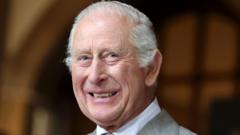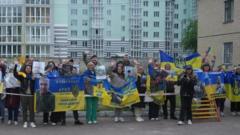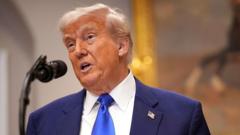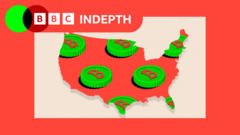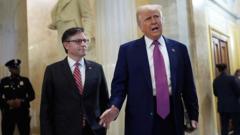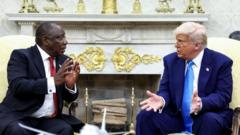Despite extensive discussions, real progress toward peace remains a distant prospect, with ongoing hostilities.
**Diplomatic Maneuvering in Ukraine: Russia's Confidence Grows Amid Stalled Peace Talks**
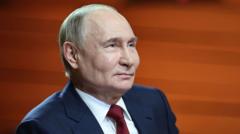
**Diplomatic Maneuvering in Ukraine: Russia's Confidence Grows Amid Stalled Peace Talks**
Tensions rise as Russia's recent diplomatic engagements reveal significant shifts, yet peace in Ukraine feels elusive.
In the early hours of the morning, as I navigated the labyrinthine pathways of the Kremlin, I found myself reflecting on the surreal atmosphere enveloping the nation. The evening began with a promise—a chance to question President Putin on critical issues. However, what transpired was a stark departure from expectation; instead of answers, the president delivered a televised statement advocating for talks with Ukraine—direct dialogue in Istanbul, to be precise.
What ensued over the following fortnight resembled a whirlwind of political exchanges, climaxing with a phone call between Putin and former President Donald Trump. However, questions linger: Are we any closer to resolving the ongoing conflict in Ukraine? The answer feels increasingly ambiguous.
Umbrage and skepticism clouded the atmosphere, particularly following Trump's endorsement of Russian-led dialogue, which diverted attention from an urgent need for an unconditional ceasefire. Fears among European leaders, coupled with Ukrainians' mistrust, have led to an uncertain geopolitical environment.
More concerning is the ongoing escalation of hostilities, with Russia's unwillingness to concede any territory it has occupied. Attempts to establish peace seem beleaguered by delay tactics—characteristic maneuvers of the Kremlin that have successfully sidestepped more stringent international pressures.
The ultimatum presented by European leaders was met with Putin's counter-offer of talks, drawing a clear line in the sand: a ceasefire contingent upon favorable diplomatic discussions. Yet, days later, the reality was stark. Russia dispatched a lower-level delegation to the Istanbul talks, which ultimately yielded minimal concessions.
The narrative being shaped by Russian media is one of a nation emboldened and victorious in diplomatic encounters. Some outlets have claimed that Trump's recent posture is synergistic with Kremlin ambitions. Experts argue that, while ongoing discussions swirl, Russia is playing a waiting game, maintaining the upper hand on the battlefield.
While Trump may have expressed more aggressive tones against the Kremlin, his approach remains subdued. Russia observes a government unwilling to disrupt its current strategy amid growing tensions. The president seems caught between maintaining diplomatic relations and curtailing aggression against Ukraine.
In conclusion, while the diplomatic overtures in recent weeks suggest a flurry of activity, the peace process in Ukraine remains an ongoing puzzle, with little clarity on the way forward. The Kremlin's strategic maneuvers reveal a pattern of patience and confidence, even as the conflict festers. The path to peace is still shrouded in uncertainty, echoing the personal confusion I experienced wandering the halls of power in the early hours of the morning.
What ensued over the following fortnight resembled a whirlwind of political exchanges, climaxing with a phone call between Putin and former President Donald Trump. However, questions linger: Are we any closer to resolving the ongoing conflict in Ukraine? The answer feels increasingly ambiguous.
Umbrage and skepticism clouded the atmosphere, particularly following Trump's endorsement of Russian-led dialogue, which diverted attention from an urgent need for an unconditional ceasefire. Fears among European leaders, coupled with Ukrainians' mistrust, have led to an uncertain geopolitical environment.
More concerning is the ongoing escalation of hostilities, with Russia's unwillingness to concede any territory it has occupied. Attempts to establish peace seem beleaguered by delay tactics—characteristic maneuvers of the Kremlin that have successfully sidestepped more stringent international pressures.
The ultimatum presented by European leaders was met with Putin's counter-offer of talks, drawing a clear line in the sand: a ceasefire contingent upon favorable diplomatic discussions. Yet, days later, the reality was stark. Russia dispatched a lower-level delegation to the Istanbul talks, which ultimately yielded minimal concessions.
The narrative being shaped by Russian media is one of a nation emboldened and victorious in diplomatic encounters. Some outlets have claimed that Trump's recent posture is synergistic with Kremlin ambitions. Experts argue that, while ongoing discussions swirl, Russia is playing a waiting game, maintaining the upper hand on the battlefield.
While Trump may have expressed more aggressive tones against the Kremlin, his approach remains subdued. Russia observes a government unwilling to disrupt its current strategy amid growing tensions. The president seems caught between maintaining diplomatic relations and curtailing aggression against Ukraine.
In conclusion, while the diplomatic overtures in recent weeks suggest a flurry of activity, the peace process in Ukraine remains an ongoing puzzle, with little clarity on the way forward. The Kremlin's strategic maneuvers reveal a pattern of patience and confidence, even as the conflict festers. The path to peace is still shrouded in uncertainty, echoing the personal confusion I experienced wandering the halls of power in the early hours of the morning.



